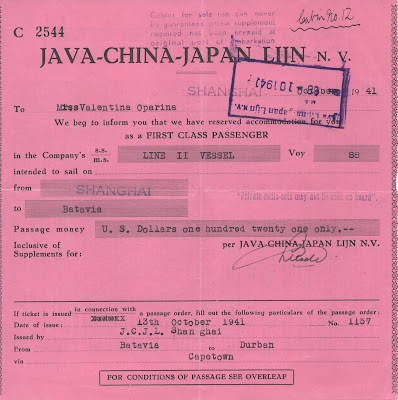A few days after the Japanese attacked Pearl Harbor in December, 1941, my mother sailed into
Durban on SS Tegelberg, a Dutch vessel that had left Batavia [now Jakarta] on 15th November. She had transferred there from another vessel, SS Tjisadane,
which had sailed from Shanghai on 17th October, one of the last passenger ships
to escape the Chinese city before the Japanese took control.
It was a bold risk she was taking; leaving behind her family and all she knew, travelling across a dangerous war-time ocean to a foreign country to marry a man she had not seen for some years.
It was a bold risk she was taking; leaving behind her family and all she knew, travelling across a dangerous war-time ocean to a foreign country to marry a man she had not seen for some years.
 |
| First voyage on SS Tjisadane |
 |
| SS Tjisadane |
 |
| Passage ticket for second part of journey Batavia-Durban 1941 |
 |
| SS Tegelberg |
As my mother sailed into Durban, she would have been thrilled - and relieved no doubt - to see her future husband waiting for her on the wharf. One wonders what she would have made of the woman who was also there singing her heart out with the aid of a megaphone.
The story of Perla Siedle Gibson will be well-known to South
Africans and many servicemen and merchant navy personnel who served during World War II and transited the
port of Durban.
 |
| All images Vintage News Stories (link below) |
She was born Perla Marie Siedle in Durban in 1888, the
daughter of Otto Siedle, originally a London watchmaker turned prominent businessman and shipowner. Her mother Mary served for a time as Deputy Mayor of Durban. Perla had two brothers, Karl and Jack.
Karl died in World War I but Jack Siedle became a famous cricketer.
Perla had a voice with a register somewhere between soprano and
contralto. She had studied singing in Europe, but did not follow a professional
career for long as she married and raised a family in South Africa.
It is said that when World War II was intensifying, she had
seen off a young Irish friend at the harbour and as the ship pulled away from
the quay, the young man shouted down to Perla to sing “something Irish”. She
immediately burst into “When Irish Eyes are Smiling” and it was a big
hit with the departing sailors. After that, she made up her mind to greet and
farewell all ships that entered Durban Harbour for the duration of the war.
She could see the daily shipping movements from her house on
a hill, and she’d jump in her car and drive down to the docks. She always wore
the same costume - a white dress, red hat and necklace. Her distinctive (and
ample!) figure could be spied from a long way off and she became known as “The
Lady in White”.
Between April 1940 and August 1945, it has been estimated
she sang to more than 5,000 merchant and navy ships and more than 250,000
servicemen. She even sang her husband (Clement Walter “Jack” Gibson) and two
sons and daughter off on war service. When she received a telegram to say that
her son, 2nd Lt. Clement Roy Gibson had been killed at Anzio in March 1944, even
though her heart must have been breaking, that didn’t stop her and she
continued singing to the ships.
 |
| Post-war - two very different "Forces Sweethearts" - Perla and Vera Lynn |
There don’t appear to be recordings or films of Perla’s
singing available on the internet, and I wonder what she sang that day as the
SS Tegelberg arrived bringing my mother to her new life? Sarie Marais? Auld
Lang Syne? Land of Hope & Glory? Maybe all of them, and more.
Ironically, I made a similar reverse journey to that of my mother when I sailed out of Durban 30 years later also to start life in a new country with a new husband. There was no operatic send off by that time. Perla had in fact died just a few months previously in 1971.
 |
| Statue to Perla at Durban, unveiled by Queen Elizabeth II in 1995 Now removed to the Durban Maritime Museum |
Perla had written an autobiography, and there are a number of articles and blog posts about her online.
With many thanks to major source: Vintage News Stories - The Lady In White
With many thanks to major source: Vintage News Stories - The Lady In White




No comments:
Post a Comment